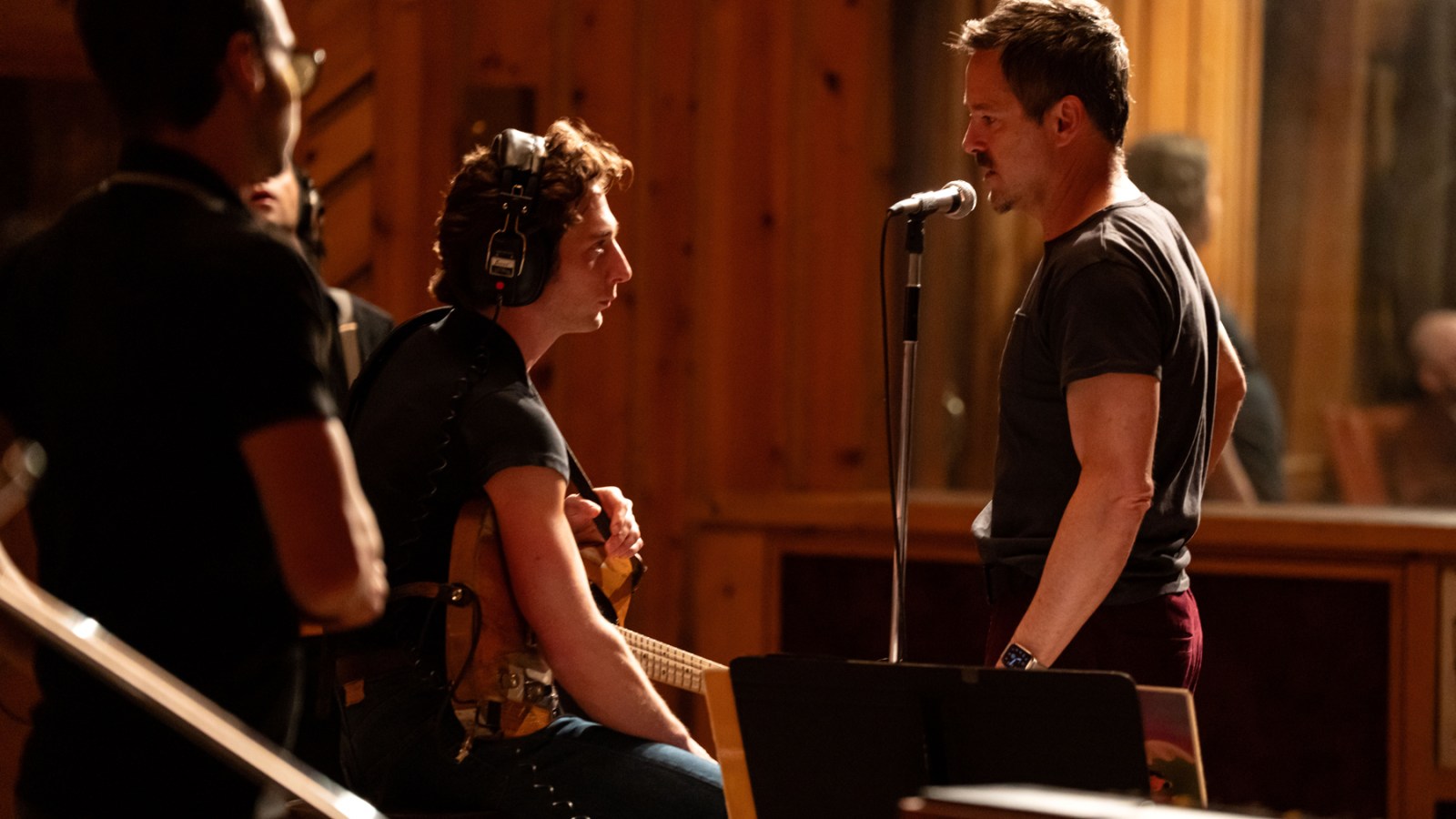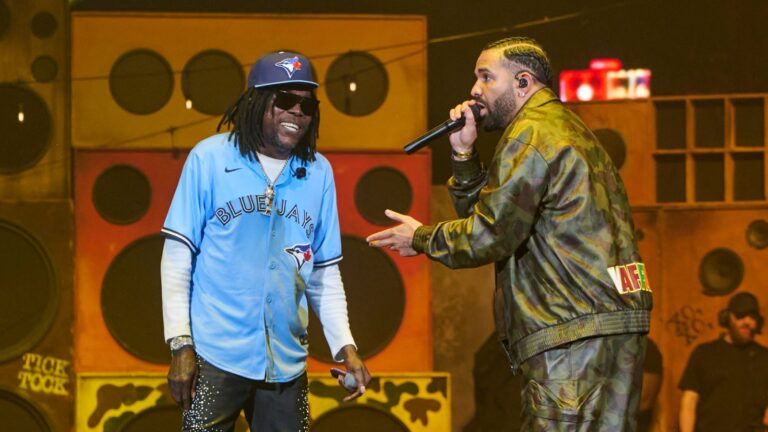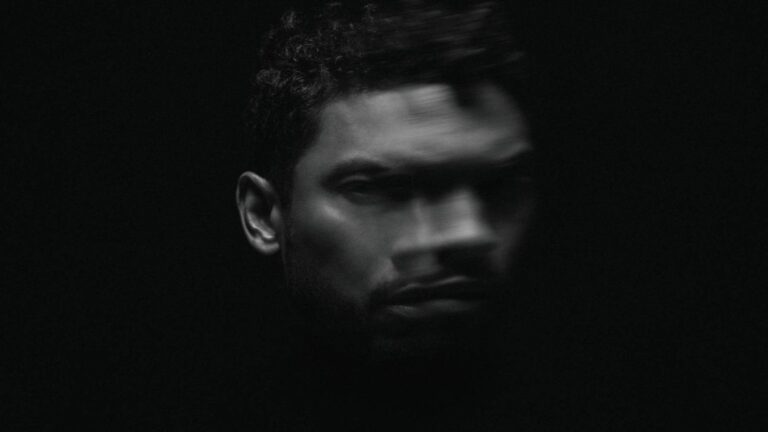While writer-director Scott Cooper was working on early screenplay drafts for Springsteen: Deliver Me From Nowhere, the real-life subject of the film made it clear how he wanted him to approach the project. “Bruce gave me a piece of advice that I felt was really critical,” Cooper says on the new episode of Rolling Stone Music Now, “which is, ‘The truth about yourself is not always pretty.’ … This film isn’t about the mythology or iconography of Bruce Springsteen. It’s about a man who happens to be Bruce, suffering through the issues that so many of us are suffering through.”
The latest episode of our Rolling Stone Music Now podcast dives into the making of the film, featuring interviews with both Cooper and actor Stephen Graham, who plays Springsteen’s father. To hear the whole episode, go here for the podcast provider of your choice, listen on Apple Podcasts or Spotify, or just press play above. Highlights from the discussion with Cooper follow, with some spoilers included (assuming that’s a thing in a biopic).
The film required Cooper to reject conventional screenwriting wisdom.
“Most screenwriting is about propulsion, movement, plot, forward momentum,” he says. “And this is a film about containment and isolation. Inherently, it isn’t meant to be cinematic. Bruce is not touring. He’s not with the E Street Band. He’s listening to himself and he has the courage to look inward and to ask himself, how honest can he be in his work? As painful as that’s going to be.”
A dark scene where Jeremy Allen White‘s Springsteen self-destructively floors his accelerator on an empty road in the middle of the night is based on a real-life moment Springsteen never disclosed before.
It’s one of several fresh details Springsteen shared with Cooper as he rewrote the film. “He said, ‘I could’ve very easily just turned the car into a tree, but I chose not to,’” Cooper recalls. The director acknowledges that having the on-the-nose choice of having Springsteen listen to Suicide’s “Frankie Teardrops” in that moment was an artistic flourish, but that the singer did tell him was his choice of music in his lowest points.
An upsetting scene with a young Bruce and his father was also based on real life.
In another incident Springsteen never mentioned before, the film shows Bruce’s father, Douglas, hitting his son. “That particular moment happened,” Cooper confirms. “And I think it took a lot of courage for Bruce to allow me to write that and film it. But I will tell you honestly, it was not easy for him, as it wouldn’t be for me. But I’m thankful that he did include it because the moments of reconciliation are stronger for it.”
The approach to the childhood flashbacks came from how Springsteen pictures his past.
When Cooper asked Bruce to describe memories of his father, Springsteen told him he remembers them “in black and white.” “It’s the emotional spine of the film,” the director explains. “It’s not just about where Bruce was in 1982. It’s about where he came from, what he’s still carrying — this memory of Freehold, the working class struggle, his very cold and dispassionate father.”
Jeremy Allen White wasn’t chosen because he looks like Bruce — he was chosen because “he feels like him.”
“The quiet volatility,” says Cooper. “The tension between vulnerability and control. The goal was never imitation, but possession — let the spirit of the [Nebraska] record move through the actor.”
One detail in the film hints at another biographical secret.
Faye (Odessa Young), the film’s fictional girlfriend, who’s a composite drawn from various real-life relationships, gives Bruce a St. Christopher’s medal — which Springsteen happens to wear in real life to this day. So did Springsteen tell Cooper that an old girlfriend actually gave him his necklace? Cooper won’t quite say: “I suppose it’s better left for your next interview with Bruce Springsteen … I’m not sure I have the balls to answer that.” Springsteen also approved of the decision to introduce the character, Cooper adds: “ That’s really the only invention in the film. He said, ‘Scott, I wasn’t a monk. I think what you’re doing is right. It’s about showing the emotional truth about my inability to connect with women that I absolutely should have.’”
The film’s original ending centered around the recording of the obscure song “County Fair,” which Springsteen wrote after having an emotional breakdown at an actual county fair during a cross-country road trip.
The new ending takes place in Asbury Park, New Jersey, with Springsteen walking out of Convention Hall with a full E Street Band live version of “Atlantic City” playing on the soundtrack. In the “County Fair” version, says Cooper, “that story would’ve ended in Los Angeles, and I felt I needed to bring this back to New Jersey. So I thought, why not have the film end with ‘Atlantic City’ where the band has [finally] gotten it, as he’s walking away from camera, a man walking forward to his future.”
Download and subscribe to Rolling Stone‘s weekly podcast, Rolling Stone Music Now, hosted by Brian Hiatt, on Apple Podcasts or Spotify, or go here for the podcast provider of your choice. Check out nine years’ worth of episodes in the archive, including in-depth interviews with artists including Mariah Carey, Bruce Springsteen, Questlove, Halsey, Missy Elliott, Dua Lipa, Neil Young, Snoop Dogg, Brandi Carlile, Phoebe Bridgers, Rick Ross, Alicia Keys, the National, Brian May, Roger Taylor, Ice Cube, Taylor Hawkins, Willow, Keith Richards, Robert Plant, Killer Mike, Julian Casablancas, Sheryl Crow, Johnny Marr, Scott Weiland, Liam Gallagher, Alice Cooper, Fleetwood Mac, Elvis Costello, John Legend, Donald Fagen, Charlie Puth, Phil Collins, Justin Townes Earle, Stephen Malkmus, Sebastian Bach, Tom Petty, Eddie Van Halen, Kelly Clarkson, Pete Townshend, Bob Seger, the Zombies, and Gary Clark Jr. And look for dozens of episodes featuring genre-spanning discussions, debates, and explainers with Rolling Stone‘s critics and reporters.



